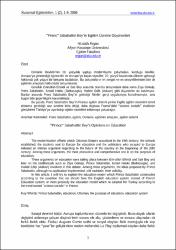"Prens" Sabahattin Bey’in Eğitim Üzerine Düşünceleri
Abstract
Osmanlı Devleti’nin 19. yüzyılda yaptığı modernleşme çalışmaları, kurduğu okullar,
Avrupa’ya gönderdiği öğrenciler ve Avrupa’ya kaçan siyasiler; 20. yüzyıl başlarında ülkenin geleceği
hakkında çok yoğun bir tartışma başlattılar. Bu tartışmaların en zengin ve en seviyelilerinden biri de
eğitimin amaçları hakkındaki tartışmalardır.
Genelde Emrullah Efendi ve Satı Bey arasında olan bu tartışmalara daha sonra Ziya Gökalp,
Prens Sabahattin, İsmail Hakkı (Baltacıoğlu), Halide Edib (Adıvar) gibi düşünürler da katılmıştır.
Bunlar arasında Prens Sabahattin Bey’in getirdiği fikirler gerçi uygulamaya konulmamıştır, ama
bugün bile geçerliliğini korumaktadır.
Bu yazıda, Prens Sabahattin Bey’in Fransız eğitim sistemi yerine İngiliz eğitim sistemini temel
almamız gerektiği savı üzerine bina ettiği, daha doğrusu Fransa’daki “science sociale” ekolünün
görüşlerini Türkiye’ye uyarladığı eğitim modelini anlatmaya çalışacağız. The modernization efforts which Ottoman Empire actualized in the 19th century, the schools
established, the students sent to Europe for education and the politicians who escaped to Europe
initiated an intense argument regarding to the future of the country in the beginning of the 20th
century. Among these arguments, the most productive and comprehensive one is on the purposes of
education.
These arguments on education were taking place between Emrullah Efendi and Sati Bey and
later on the intellectuals such as Ziya Gökalp, Prince Sabahattin, Ismail Hakki (Baltacioglu), and
Halide Edip (Adivar) involved in this debate. Among these arguments, the ideas proposed by Prince
Sabahattin, although no application implemented, still maintain their validity.
In this article, I will try to explain the education model which Prince Sabahattin constructed
according to the assertion that we should take the English education system instead of French
Education system; or more precisely the education model which he adopted for Turkey according to
the trend named "science sociale" in France.
Source
Kuramsal Eğitimbilim DergisiVolume
1Issue
2Collections
- Cilt 1 : Sayı 2 [8]



















